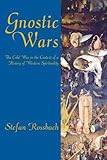Gnostic Wars : The Cold War in the Context of a History of Western Spirituality / Stefan Rossbach.
Material type: TextPublisher: Edinburgh : Edinburgh University Press, [2022]Copyright date: ©1999Description: 1 online resource (256 p.)Content type:
TextPublisher: Edinburgh : Edinburgh University Press, [2022]Copyright date: ©1999Description: 1 online resource (256 p.)Content type: - 9780748610242
- 9781474472180
- 200.9 21
- online - DeGruyter
- Issued also in print.
| Item type | Current library | Call number | URL | Status | Notes | Barcode | |
|---|---|---|---|---|---|---|---|
 eBook
eBook
|
Biblioteca "Angelicum" Pont. Univ. S.Tommaso d'Aquino Nuvola online | online - DeGruyter (Browse shelf(Opens below)) | Online access | Not for loan (Accesso limitato) | Accesso per gli utenti autorizzati / Access for authorized users | (dgr)9781474472180 |
Frontmatter -- Contents -- Acknowledgements -- 1. Introduction -- 2. Liminality in Platonic philosophy and early Christian thought -- 3. Issues in 'Gnostic Studies' -- 4. Lines of meaning I: From Manichaeism to 'Neo-Manichaeism' -- 5. Intersections: Renaissance syncretism -- 6. Lines of meaning II: Boehme, Hegel, Marx -- 7. Lines of meaning III: The Third Rome against the New World -- 8. Parrhesia against Gnosis: George F. Kennan on the spiritual dimension of the Cold War -- 9. Epilogue -- Bibliography -- Index
restricted access online access with authorization star
http://purl.org/coar/access_right/c_16ec
In this unique exposition of important and yet often neglected developments in the history of Western spirituality, Stefan Rossbach reminds us of the philosophical and spiritual underpinnings of the Cold War era, drawing on the traditions of apocalypticism, millenarianism and 'Gnostic' spirituality.Beginning with the 'Gnostic' systems of late Antiquity, the analysis follows 'lines of meaning' which extend through the late Middle Ages and the Renaissance, right up to the present. From the long-term perspective which is thereby established, the spectre of a man-made nuclear apocalypse appears as the latest and most dramatic expression of an outlook on the human condition which refuses to accept limits in the imposition of human designs on the world. The paradoxical continuities that underlie the sense of epoch evoked by the end of the Cold War highlight this work's profound implications for our understanding of contemporary international politics.
Issued also in print.
Mode of access: Internet via World Wide Web.
In English.
Description based on online resource; title from PDF title page (publisher's Web site, viewed 02. Mrz 2022)


